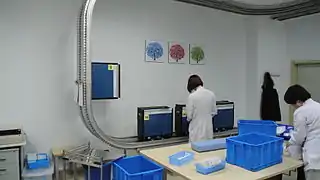Hospital pharmacy
A hospital pharmacy is a dispensary within a hospital that stocks and dispenses inpatient medications. Hospital pharmacies usually stock a larger range of medications, including more specialized and investigational medications (medicines that are being studied, but have not yet been approved), than would be feasible in the community setting. Hospital pharmacies may also dispense over-the-counter and prescription medications to outpatients.


Hospital pharmacies may provide a huge quantity of medications per day which is allocated to the wards and to intensive care units according to a patient's medication schedule. Larger hospitals may use automated transport systems to aid in the efficient distribution of medications.
Hospital pharmacists and trained pharmacy technicians compound sterile products for patients such as total parenteral nutrition (TPN) and other medications given intravenously such as neonatal antibiotics and chemotherapy. Some hospital pharmacies may outsource high-risk preparations and some other compounding functions to companies that specialize in compounding.
In the United States, hospital pharmacy was not a significant practice until the 1920s. In the 18th and 19th centuries, the medicine and pharmacy were commonly one practice, in which a medical apprentice would be responsible for the drug preparation.[1]
See also
References
- Holdford, David (2017). Introduction to Acute and Ambulatory Care Pharmacy Practice, Second Edition. pp. 21–26. ISBN 1585285455.